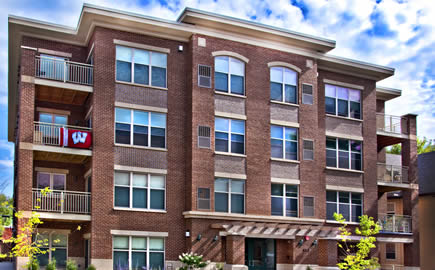Madison, Wisconsin, is on a building binge. Developers are constructing so much rental housing that market observers fear that the housing shortage could quickly turn into a glut. One thousand units were approved last year for large apartment complexes.

There’s a reason behind all this building, according to an article in yesterday’s Isthmus: Young professionals, especially employees of the Madison-based software company Epic, are clamoring for downtown living and shunning the suburban development that characterized Madison-area building until recently.
With an eye toward Epic professionals, though, developers are almost exlusively building high-end apartments. Rents like $895 for a studio and $2,165 for a three-bedroom might sound like a bargain to our readers in New York, DC, and San Francisco, but in Madison, that’s a hefty chunk of change. Those prices risk forcing people to pay more than a third of their incomes on rent, which is ill-advised.
There’s an answer to that, says Nina Gruen, a market researcher and real estate strategist writing in the Urban Land Institute blog this week. All around the country, younger folks are flocking to rental housing -- and not just the high-earning whiz kids. Their parents are finally kicking them out and they're getting their own places (if they’re lucky, with the help of a little allowance Mom and Dad gave as a consolation prize). They prefer the vibrancy of the city to the sleepiness of the suburbs. They’re starting families later in life, so they’re happy with smaller digs.
“Since 2009, there has been a steady increase in multifamily construction,” Gruen writes, “climbing from 109,000 units in 2009 to 245,000 units in 2012, according to the U.S. Census Bureau.” People under 30 are a primary market for those new urban units.
And Gruen has some ideas for how to build for the kicked-out-of-their-parents’-basement subset of the millennial generation – which she dubs the “echo boomers” -- as opposed to the well-heeled software professionals. She says they’re looking for small studios -- as in, 250 square feet -- or else they want to share a two-bedroom among three or four people. They don’t care so much about closet space but a fast internet connection is essential. They prefer flexible, open space to formal entertaining areas, and they’re happy to share party rooms, bike storage, and fitness facilities with other renters. And Gruen gets into details others gloss over: “Multifamily rentals that permit dogs ought to consider including outdoor dog washes in order to avoid clogged sinks from dog hair.”
The moral of the story is this: Whether we’re talking about software engineers or coffee slingers, young people want to live in cities. After years of housing shortages and skyrocketing rents, supply is finally beginning to catch up to demand.





